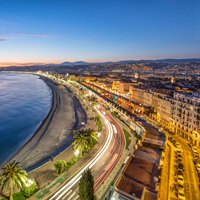Retire in French Riviera Guide
Summary: Retire in French Riviera with confidence, armed with the knowledge from our extensive guide. It covers critical considerations for retirees, from the cost of living and climate to housing, healthcare, and residency choices in French Riviera. We also delve into the social and cultural scene, volunteering options, public transportation facilities, and the city's walkability, helping you make an informed decision.
The French Riviera, or Côte d'Azur, is a dream retirement destination for many international retirees. With its stunning coastline, sunny climate, and rich cultural heritage, it's no wonder that so many people choose to spend their golden years here. However, retiring in the French Riviera also comes with its own set of challenges, from navigating the cost of living to learning the language. In this article, we'll explore what it's like to retire in this beautiful part of France.
Understanding the Cost of Living
The cost of living in the French Riviera can be quite high, especially in popular cities like Nice and Cannes. However, it's possible to find more affordable options in smaller towns and villages. Housing tends to be the biggest expense, with prices varying greatly depending on location and property type. Groceries, dining out, and other everyday expenses can also add up, but many retirees find that the high quality of life is worth the cost.
Enjoying the Mediterranean Climate
The French Riviera is known for its mild, Mediterranean climate. Summers are hot and dry, with temperatures often reaching into the 30s (Celsius), while winters are mild and wet. The region enjoys around 300 days of sunshine per year, making it a great place for outdoor activities and enjoying the beautiful beaches and landscapes.
Accessing Quality Healthcare
France is renowned for its high-quality healthcare system, and the French Riviera is no exception. There are numerous hospitals and clinics in the region, many of which offer services in English. However, it's important for retirees to understand the French healthcare system and consider their insurance options.
Navigating the Public Healthcare System
France's public healthcare system, known as Assurance Maladie, is available to all residents, including international retirees. However, it doesn't cover all healthcare costs, so many people choose to take out supplementary private insurance. It's also worth noting that while many doctors and healthcare professionals speak English, this isn't always the case, so learning some French can be beneficial.
Exploring Residency Options
There are several options for international retirees looking to establish residency in the French Riviera. The most common is the long-stay visitor visa, which allows you to live in France for up to a year. After five years of living in France, you can apply for permanent residency.
Discovering Parks and Recreational Activities
The French Riviera is home to a wealth of parks and recreational activities. From hiking in the Mercantour National Park to strolling along the Promenade des Anglais in Nice, there's something for everyone. The region is also famous for its golf courses and yacht clubs, offering plenty of opportunities for leisure and relaxation.
Dining at Local Restaurants
The French Riviera is a food lover's paradise, with a plethora of restaurants serving up everything from traditional Provençal cuisine to international dishes. Some popular, reasonably priced options include Le Safari in Nice and Le Suquet in Cannes.
Learning the French Language
While it's possible to get by in the French Riviera with just English, learning French can greatly enhance your experience. There are numerous language schools in the region, such as the Alliance Française in Nice, which offer courses for all levels.
Getting to Know the Locals
The French Riviera is a diverse region, with a mix of locals and expats from around the world. The locals are known for their laid-back lifestyle and love of good food and wine. While they can be reserved at first, they're generally friendly and welcoming once you get to know them.
Exploring the Housing Market
International retirees in the French Riviera live in a variety of housing types, from apartments in the city center to villas in the countryside. The choice largely depends on personal preference and budget. Some popular areas for retirees include the Old Town of Nice and the quaint village of Eze.
Getting Around Without a Car
While having a car can be convenient for exploring the wider region, it's not essential. The French Riviera has an extensive public transportation system, including buses, trams, and trains. Many towns and cities are also highly walkable, with plenty of amenities within easy reach.
About the Author
 Betsy Burlingame is the Founder and President of Expat Exchange and is one of the Founders of Digital Nomad Exchange. She launched Expat Exchange in 1997 as her Master's thesis project at NYU. Prior to Expat Exchange, Betsy worked at AT&T in International
and Mass Market Marketing. She graduated from Ohio Wesleyan University
with a BA in International Business and German.
Betsy Burlingame is the Founder and President of Expat Exchange and is one of the Founders of Digital Nomad Exchange. She launched Expat Exchange in 1997 as her Master's thesis project at NYU. Prior to Expat Exchange, Betsy worked at AT&T in International
and Mass Market Marketing. She graduated from Ohio Wesleyan University
with a BA in International Business and German.
Some of Betsy's articles include 12 Best Places to Live in Portugal, 7 Best Places to Live in Panama and 12 Things to Know Before Moving to the Dominican Republic. Betsy loves to travel and spend time with her family. Connect with Betsy on LinkedIn.



